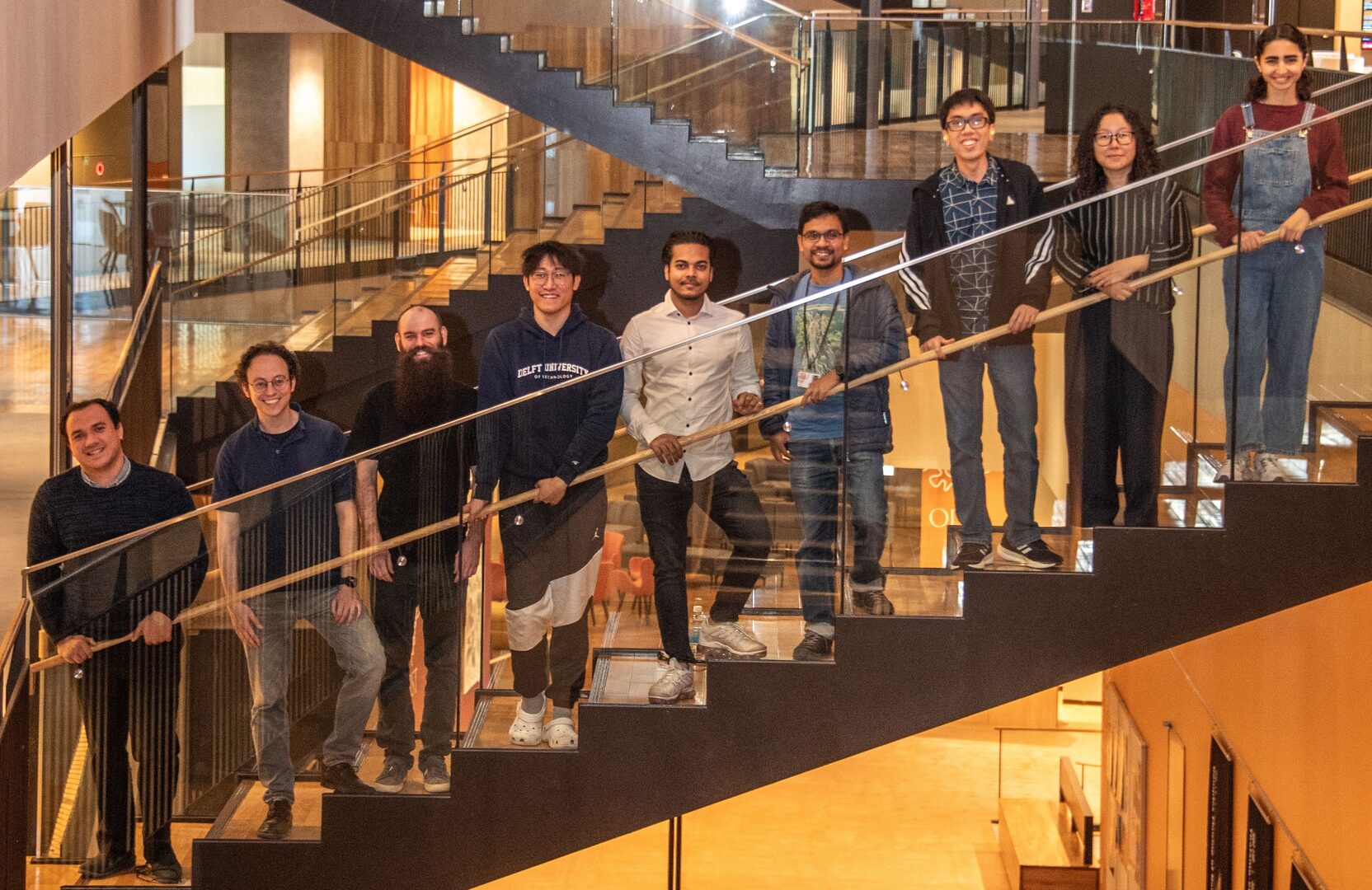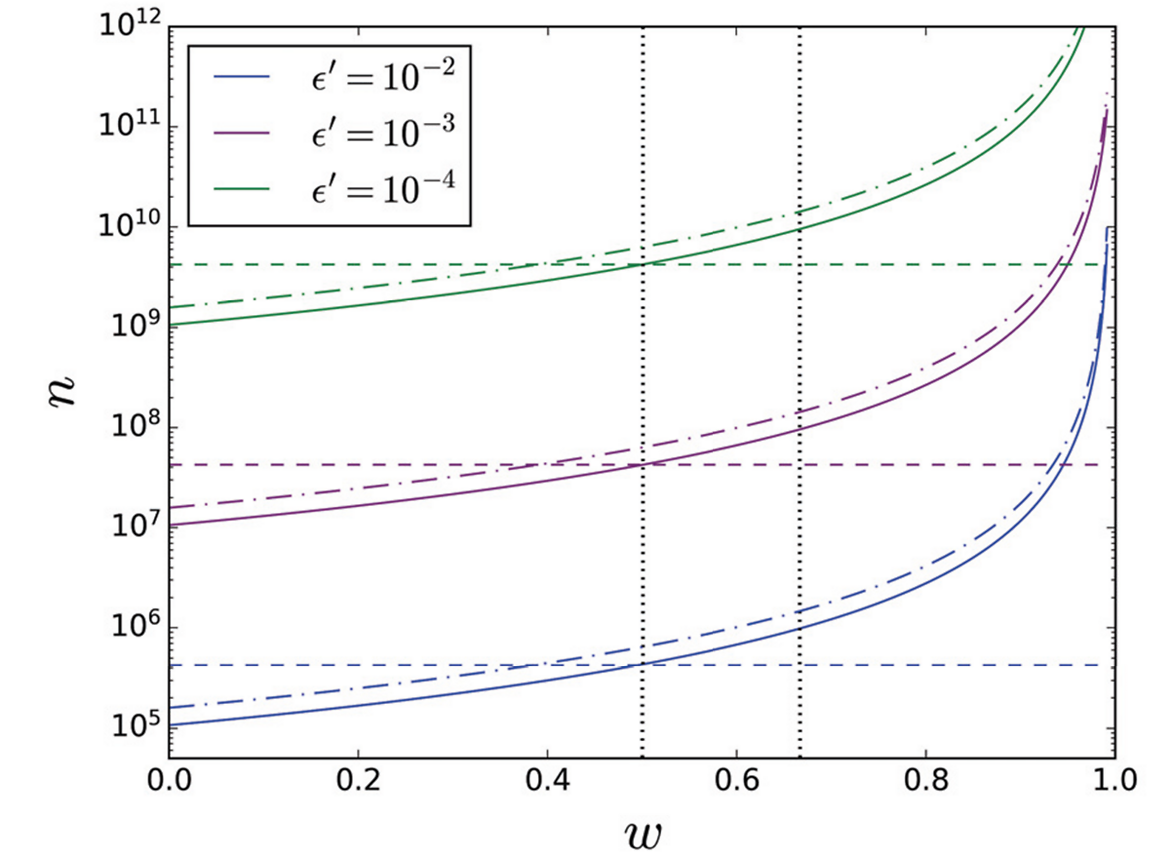FY2023 Annual Report
Networked Quantum Devices Unit
Associate Professor David Elkouss

Abstract
The networked quantum devices unit started activity in 2022. The goal of the unit is to develop the necessary theoretical tools such as novel error correction mechanisms as well as insights into the fundamental limitations, cryptographic protocols, or simulation algorithms that will enable near-term proof of principle demonstrations of quantum networks and their applications.
1. Staff
- David Elkouss, associate professor
- Yukari Yoseda, research unit administrator
- Ananda G. Maity, postdoctoral researcher
- Manuel Goulão, postdoctoral researcher
- Faedi Loulidi, postdoctoral researcher
- Joshua Carlo Aparicio Casapao, PhD student
- Siddhant Singh, visiting PhD student
- Samuel Begumya, rotation student
- Jiajun Chen, rotation student
- Zhenghan Yuan, rotation student
- Kyle Grant, rotation student
- Zherui Wang, intern
- Marcel Mordarski, intern
- Golshan Lirabi, intern
2. Collaborations
2.1 Enumeration of distillation protocols
- Type of collaboration: Joint research
- Researchers:
- David Elkouss, OIST
- Shin Sun, OIST
- Kenneth Goodenough, University of Massachussets Amherst
- Sebastian de Bone, TU Delft
- Sarah Jansen, University of Amsterdam
- Dion Gijswijt, TU Delft
- Vaishnavi Addala, MIT
- Stean Krastanov, MIT
2.2 Color centers in diamond for distributed quantum computation
- Type of collaboration: Joint research
- Researchers:
- David Elkouss, OIST
- Sebastian de Bone, TU Delft
- Siddhant Singh, OIST & TU Delft
- Tim Taminiau, TU Delft
- Connor Bradley, University of Chicago
- Stefan Wong, TU Delft
- Folkert de Ronde, TU Delft
2.3 Entanglement estimation
- Type of collaboration: Joint research
- Researchers:
- David Elkouss, OIST
- Ananda Maity, OIST
- Joshua Casapao, OIST
- Zherui Wang, OIST
- Rod Van Meter, Keio University
- Michal Hajdusek, Keio University
- Naphan Benchasattabuse, Keio University
3. Activities and Findings
3.1 Werner states can be efficiently estimated from distillation outcomes
Estimating noise processes is an essential step for practical quantum information processing. Standard estimation tools require consuming valuable quantum resources. Here we ask the question of whether the noise affecting entangled states can be learned solely from the measurement statistics obtained during a distillation protocol. As a first step, we consider states of the Werner form and find that the Werner parameter can be estimated efficiently from the measurement statistics of an idealized distillation protocol. Our proposed estimation method can find application in scenarios where distillation is an unavoidable step.

Figure: Minimum number of samples n required for estimating the Werner parameter w with failure probability Pr(|wˆ − w| ≥ epsilon)=0.01. The solid (dashed) curves correspond to the estimation via a noise-free distillation protocol (via tomography). The dash-dotted curves correspond to the distillation protocol in the presence of depolarizing noise, where S = exp(−1/5). For the range w ≤ 1/2, we find that the number of samples required for a successful distillation-based estimation can be significantly less than that for tomography.
3.2 GHZ distillation in the presence of decoherence
We introduced a novel heuristic approach to optimize the performance of Greenberger-Horne- Zeilinger (GHZ) creation and distillation protocols under decoherence. Our methodology converts these protocols into a practical set of instructions, demonstrating, through simulations, the production of higher-quality GHZ states than previously known protocols. This advancement contributes to the field of distributed quantum computing by addressing the need for high-quality entanglement required for operations between different quantum computers.

Figure: (a) Binary tree consuming a minimum of four entangled pairs. (b) Time steps for the operations in this binary tree. (c) Protocol recipe for this binary tree.
4. Publications
4.1 Journals
- LIMDD: A Decision Diagram for Simulation of Quantum Computing Including Stabilizer States, Vinkhuijzen, L., Coopmans, T., Elkouss, D., Dunjko, V., & Laarman, A. Quantum, 7, 1108 (2023). https://doi.org/10.22331/q-2023-09-11-1108
- Quantum repeaters: From quantum networks to the quantum internet, K. Azuma, S. E. Economou, D. Elkouss, P. Hilaire, L. Jiang, H-K. Lo, and I. Tzitrin. Reviews of Modern Physics 95, 045006 (2023). https://doi.org/10.1103/RevModPhys.95.045006
- Assessing non-Markovian dynamics through moments of the Choi state, B. Mallick, S. Mukherjee, A. G. Maity, A. S. Majumdar. Physical Review A, 109, 022247 (2024). https://doi.org/10.1103/PhysRevA.109.022247
- Noise estimation in an entanglement distillation protocol, Ananda G. Maity, Joshua C. A. Casapao, Naphan Benchasattabuse, Michal Hajdusek, Rodney Van Meter, David Elkouss, ACM SIGMETRICS Performance Evaluation Review Volume 51 Issue 2 pp 66–68 (2023). https://doi.org/10.1145/3626570.3626594 (Issue publishing the proceedings of ACM SIGMETRICS)
- GHZ distillation protocols in the presence of decoherence, Sebastian de Bone, David Elkouss, ACM SIGMETRICS Performance Evaluation Review Volume 51 Issue 2 pp 81–83 (2023). https://doi.org/10.1145/3626570.3626599 (Issue publishing the proceedings of ACM SIGMETRICS)
4.2 Conference proceedings
- Low-Depth Flag-Style Syndrome Extraction for Small Quantum Error-Correction Codes, D. Bhatnagar, M. Steinberg, D. Elkouss, C. G. Almudever and S. Feld, 2023 IEEE International Conference on Quantum Computing and Engineering (QCE). https://doi.org/10.1109/QCE57702.2023.00016
- Micro-architecture and Control Electronics Simulation of Modular Color Center-Based Quantum Computers, Folkert de Ronde, Matti Dreef, Stephan Wong, David Elkouss, SAMOS 2023 International Conference on Embedded Computer Systems. https://link.springer.com/chapter/10.1007/978-3-031-46077-7_10
4.3 Oral and Poster Presentations
- Keynotes
- Towards near term quantum networks. ASCR Basic Research Needs in Quantum Computing and Networking. https://web.cvent.com/event/6e6af0a5-4166-4baa-9bd2-bc48ab7be5c3/summary
- Invited presentations and panels
- Characterization and optimization of quantum repeater networks. Quantum innovation 2023 in Tokyo, Japan. https://site2.convention.co.jp/quantum-innovation/
- Tools for designing near-term quantum networks. XII Conference on Quantum Foundations in Buenos Aires, Argentina. https://sites.google.com/fisica.unlp.edu.ar/xiicqf
- Towards long distance quantum communications: an introduction to quantum repeater protocols and architectures. Lecture at the Coherent Quantum Dynamics 2023. https://groups.oist.jp/cqd/cqd-2023
- Feedback in quantum information theory: from assisted capacities to noise contextuality. Feedback in Quantum Machines 2023 workshop. https://groups.oist.jp/fqm23
- Random tensor networks. Quantum Information Theory and Free Probability Theory conference in Abu Dhabi. https://wp.nyu.edu/abudhabi-qit_fpt/auto-draft-8/
- Optimizing entanglement distribution in near-term quantum networks. QR.X-Workshop III - Recent developments in quantum repeater technology and theory.
- Panel presentation at SPPCOM June 2 2023. https://www.optica.org/events/congress/advanced_photonics_congress/program/signal_processing_in_photonic_communications/
- Contributed oral presentations without proceedings (with proceedings see publications)
- Noise estimation in distillation protocols. International Workshop on Quantum Information Engineering (QIE2023) held at OIST. https://groups.oist.jp/qist/1st-international-workshop-quantum-information-engineering-qie2023
- Noise resource contextuality. International Workshop on Quantum Information Engineering (QIE2023) held at OIST. https://groups.oist.jp/qist/1st-international-workshop-quantum-information-engineering-qie2023
- Noise is resource-contextual. 49th Quantum Information Technology Symposium (QIT49). https://www.ieice.org/es/qit/qit49/index_e.html
- Noise is resource-contextual in quantum communication. International conference on Photonics, Quantum Information, and Quantum Communication, Kolkata, under BoseStat@100: Centenary of Bose Statistics. https://www.bose.res.in/Conferences/PQIQC23/
- Poster presentations
- 23rd Asian Quantum Information Science Conference, Aug 28 to Sep 1st at Seoul, South Korea. http://aqis-conf.org/2023
- International conference on Quantum Information Processing (QIP), January 13 to 19 2024 (x3). https://qip2024.tw
- Quantum Networks Workshop (QuNeW), July 19 to 21st 2023 at The Wylie Center, MA, USA (x2).
- Moonshot goal 6 general meeting, March 27 to 29 2024 at Tokyo, Japan.
5. Intellectual Property Rights and Other Specific Achievements
Nothing to report
6. Meetings and Events
6.1 Security of Discrete-Modulated Continuous-Variable Quantum Key Distribution
- Date: October 10, 2023
- Venue: OIST Campus Central Building
- Speaker: Dr. Stefan Baeuml, Institute of Photonic Sciences
- Link: https://groups.oist.jp/netq/event/security-discrete-modulated-continuous-variable-quantum-key-distribution
6.2 Compatibility and nonlocality
- Date: June 8, 2023
- Venue: OIST Campus Center Building
- Speaker: Mr. Faedi Loulidi, Laboratoire de Physique Theorique
- Link: https://groups.oist.jp/netq/event/compatibility-and-nonlocality
6.3 One shot purity distillation using local noisy operations and one way classical communication
- Date: April 10, 2023
- Venue: OIST Campus Center Building
- Speaker: Dr. Aditya Nema, RWTH Aachen
- Link: https://groups.oist.jp/netq/event/one-shot-purity-distillation-using-local-noisy-operations-and-one-way-classical
6.4 Materials for quantum computing: On and off the beaten path
- Date: November 6, 2023
- Venue: OIST Campus Lab 5
- Speaker: Dr. Giordano Scapucci, QuTech TU Delft
- Link: https://groups.oist.jp/netq/event/materials-quantum-computing-and-beaten-path
6.5 Fully Passive Quantum Key Distribution Protocols
- Date: October 23, 2023
- Venue: OIST Campus Central Building
- Speaker: Dr. Wenyuan Wang, University of Hong Kong
- Link: https://groups.oist.jp/netq/event/fully-passive-quantum-key-distribution-protocols
6.6 Entanglement topography of large-scale quantum networks
- Date: December 13, 2023
- Venue: OIST Campus Lab 5
- Speaker: Prof. Siddhartha Santra, Indian Institute of Technology Bombay, India
- Link: https://groups.oist.jp/netq/event/entanglement-topography-large-scale-quantum-networks
6.7 Haar random and pretty good measurements for state estimation
- Date: December 12, 2023
- Venue: OIST Campus Lab 5
- Speaker: Dr. Maria Quadeer, Nanyang Technological University
- Link: https://groups.oist.jp/netq/event/haar-random-and-pretty-good-measurements-state-estimation
6.8 Multi-Photon Interference
- Date: December 19, 2023
- Venue: OIST Campus Lab 5
- Speaker: Dr. Daniel Bhatti, Institute for Functional Matter and Quantum Technologies, University of Stuttgart
- Link: https://groups.oist.jp/netq/event/multi-photon-interference
6.9 Minimizing Resources for Quantum Tasks: Error Correction and Algorithms
- Date: January 26, 2024
- Venue: OIST Center Building
- Speaker: Mr. Ariel Shlosberg, University of Colorado Boulder/JILA
- Link: https://groups.oist.jp/netq/event/minimizing-resources-quantum-tasks-error-correction-and-algorithms
6.10 Policies for entanglement distribution in quantum networks: theory and practical performance analysis
- Date: February 27, 2024
- Venue: OIST Campus Lab 4
- Speaker: Mr. Stav Haldar, Louisiana State University
- Link: https://groups.oist.jp/netq/event/policies-entanglement-distribution-quantum-networks-theory-and-practical-performance
6.11 Seminar at Cambridge U
- Date: October 25, 2023
- Speaker: Marcel Mordarski
- Venue: University of Cambridget, Thom's group
- Link: https://www.ch.cam.ac.uk/group/thom/quantum-computing-quantum-chemistry-discussion-group
6.12 Modular architectures and entanglement schemes for error corrected distributed quantum computing
- Date: February 5, 2024
- Speaker: Siddhant Singh
- Venue: Riken
- Seminar name: 106th RQC at Riken.
- https://rqc.riken.jp/en/events/20240202_106th-rqc-seminar.html
6.13 Challenges for implementing communications tasks in near term quantum networks
- Date: December 27, 2023
- Speaker: David Elkouss
- Venue: NTT Research Labs at Atsugi
6.14 Quantum versus classical: Identifying the value of a random variable unambiguously
- Date: March 11, 2024
- Venue: OIST Campus Lab 5
- Speaker: Dr. Saronath Halder, University of Warsaw
- Link: https://groups.oist.jp/netq/event/quantum-versus-classical-identifying-value-random-variable-unambiguously
7. Other
Nothing to report.



